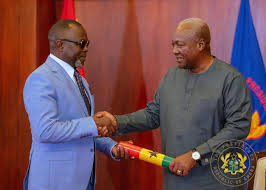President John Dramani Mahama’s nomination of seven justices to the Supreme Court has triggered significant public interest and commentary, particularly on social media.
While some have questioned the timing and volume of the nominations, others argue that the move is constitutional, necessary, and ultimately beneficial for Ghana’s judicial system.
Former Director of the National Identification Authority (NIA), Osei Kwame Griffiths, addressed the public concern over the nominations in a conversation.
“If you look at the Constitution, if you look at Article 112, it does not put a cap on the number of justices you can appoint to the Supreme Court. It says a minimum of 10, and what that means is that you can have more than 10″
Osei Kwame Griffiths, Former Director of NIA
Griffiths pushed back against accusations that President Mahama is “packing” the Supreme Court, citing constitutional backing for the nominations.
Griffiths further clarified that the President has not actually appointed the justices, but only nominated them for consideration. “He appoints on the advice of the Judicial Council,” Griffiths explained.
“In a better word, I may even want to say he has recommended… that’s the way it is, and what he has done is in consultation with the Council of State”
Osei Kwame Griffiths, Former Director of NIA
The nominations, which are yet to be confirmed, include 7 distinguished justices of the Court of Appeal with years of service on the bench. The Judicial Council is expected to evaluate the candidates and advise the President before they are vetted by Parliament.

Premised on this understanding, Griffiths emphasized that there has been no violation of law, stating plainly, “there has been no breach; he hasn’t offended any law in this country.”
Judicial Overload
The nominations, according to Griffiths, are a necessary response to the realities faced by Ghana’s legal system. He pointed to systemic delays and workload challenges that impede timely justice delivery.
“There are so many instances where one would testify that a case can go to court and sometimes, about ten years, it’s still there.
“Obviously, this is one of the challenges that we have with our judicial system. That’s because sometimes they get overwhelmed by the things that they have to do”
Osei Kwame Griffiths, Former Director of NIA
He added that justice requires deep reflection, even in small domestic settings, drawing a parallel to legal judgments.
“Consider how even if you are in your own house and an issue comes about where you need to pass judgment, perhaps among your own children… consider how you need to make sure you understand it very well – that is if you wanna do the right thing”
Osei Kwame Griffiths, Former Director of NIA
Griffiths recalled the case of Daniel Domelevo, Ghana’s former Auditor-General, to highlight the consequences of judicial delay.
“By the time the Supreme Court came about to actually pass judgment in his favor, he was already out. If there had been enough time for them to really look at the issue expeditiously, maybe we could have prevented him being booted out the way he was”
Osei Kwame Griffiths, Former Director of NIA
Ghanaians Engaged
Private legal practitioner Martin Kpebu added his voice to the ongoing conversation, describing the current national debate as “very robust.” He said the public’s reaction to the nominations is an encouraging sign of civic vigilance.

“That tells you that Ghanaians are awake and involved in what has to do with the Supreme Court nominations”
Martin Kpebu, Private Legal Practitioner
Griffiths agreed that public interest in the judiciary has increased in recent years due to past political developments.
“People seem to be very interested in what happens with regards to judicial service,” he said, observing that public scrutiny has intensified since certain judicial decisions were perceived to be politically aligned.
“I think prior to the election and in the past administration, certain things that occurred gave us all room to be concerned. The allegations that some people were of certain political coloration”
Osei Kwame Griffiths, Former Director of NIA
Despite these concerns, Griffiths maintained that President Mahama’s nominations fall squarely within the constitutional framework and reflect the foresight of the nation’s democratic design.
“I believe the framers of the Constitution knew that as we grow as a democracy, the challenges of the time may require that we have more justices on the bench”
Osei Kwame Griffiths, Former Director of NIA
As the Judicial Council prepares to advise the President, the conversation around Ghana’s judiciary continues to grow more nuanced, reflecting a maturing democratic awareness among citizens.
READ MORE: UESD-MasterCard Foundation Collaboration Launches Bold 10-Year Job Creation Plan


















